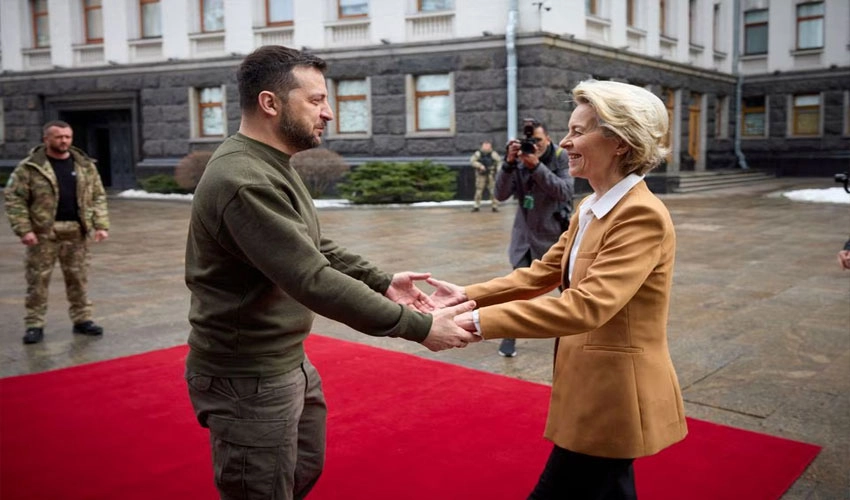EU-Ukraine wartime summit to deliver on some issues, disappoint on others

KYIV (Reuters) - European Union leaders will meet Ukrainian President Volodymyr Zelenskiy in Kyiv on Friday, bringing the promise of new sanctions against Russia but likely dashing Ukraine's hope for swift EU membership.
The head of the group's executive commission, Ursula von der Leyen, arrived in Kyiv by train on Thursday, a symbolic journey to demonstrate support for Ukraine as the first anniversary of Russia's Feb. 24, 2022, invasion of its neighbour approaches.
Senior members of the EU's executive met their counterparts in the Ukrainian government, and von der Leyen and the chairman of the 27 EU national leaders, Charles Michel, will convene talks with Zelenskiy on Friday.
Zelenskiy called for more punitive measures against Russia by the European Union, but new sanctions the bloc is preparing for the anniversary are set to fall short of his government's demands.
"We reached a very important mutual understanding," Zelenskiy said of Thursday's talks. "That only together - a strong Ukraine and a strong European Union - can we defend the life that we value, and through our further integration, provide energy and motivation for our people to fight on regardless of obstacles and threats."
While the EU backs Ukraine and supports democratic and economic reforms there it declines to offer a fast track to membership while Ukraine is at war.
EU officials have listed multiple entry requirements, from political and economic stability to adopting various EU laws. The process is likely to take years.
"Some may want to speculate about the end game but the simple truth is that we are not there yet," an EU official said.
The last country to have joined the EU was Croatia in 2013, a decade after formally applying. Ukraine's neighbour Poland took 20 years until joining in 2004.
Ukraine applied to join shortly after the invasion and in June received formal candidate status from the EU.
ANTI-CORRUPTION DEMANDS
EU officials said Thursday's talks included more arms and money for Ukraine as well as more access for its products in the EU market, helping Kyiv cover energy needs, sanctions on Russia and prosecuting its leadership for the war.
The German government has approved the delivery of Leopard 1 tanks to Ukraine from industrial stocks and is in talks on purchasing back 15 Gepard tanks from Qatar to send there, the Sueddeutsche Zeitung newspaper reported on Friday, citing government sources.
The EU has demanded more anti-corruption measures from Ukraine, which is perceived as having endemic state graft, saying it must build a credible track record.
To that end, Zelenskiy has this year announced investigations and dismissals of some officials, pointedly saying that the defence ministry needs to be clean.
Authorities were investigating senior military officials in two cases of suspected corruption, officials said on Thursday. Separately, a criminal group suspected of embezzling state funds by selling overpriced eggs and other foodstuffs to defence officials had been arrested, the State Bureau of Investigation said.
EASTERN BATTLEGROUND
The EU-Ukraine summit coincides with an intensification of Russian pressure on Ukrainian forces in eastern battlegrounds and also in the northeast and south.
Serhiy Cherevatiy, a spokesman for the Ukrainian armed forces eastern front, said Russia's main asset was the number of forces it can deploy.
"They bring in men from their draft and try systematically to find places to break through our defences," he told Ukrainian radio NV. "The aim is to fulfil the goal of the leadership to take control of all of Donetsk region. But this plan has been disrupted now for several months running."
In Washington, CIA Director William Burns said battlefield developments in the next six months would be "absolutely crucial" and that Russian President Vladimir Putin was not serious about negotiations.
"The key is going to be on the battlefield in the next six months, it seems to us," Burns told a gathering at Georgetown University, adding: "Puncturing Putin's hubris; making clear that he's not only not going to be able to advance further in Ukraine, but as every month goes by he runs a greater and greater risk of losing the territory that he has illegally seized from Ukraine so far."
Russian forces made two strikes on the town of Kramatorsk in the Donetsk region, damaging buildings and causing some civilian casualties, the Ukrainian military said late on Thursday. A Russian missile hit an apartment block in the town on Wednesday, killing three people.
Ukrainian aircraft launched four raids on concentrations of Russian troops and one command post, it said.
Reuters was not able to verify battlefield reports.
Ukraine and its Western allies have accused Russian forces of war crimes and targeting civilians, charges Russia rejects.
Putin ordered what he called a "special military operation" to protect Russian security. Ukraine and its allies accuse Russia of an unprovoked war to grab territory.







